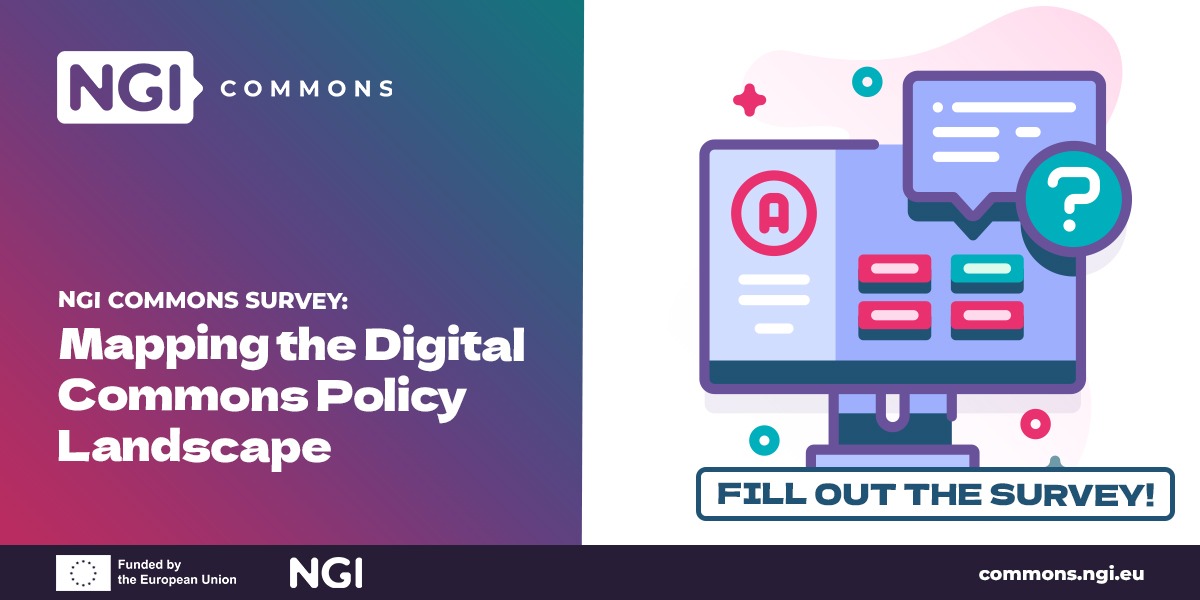Introduction
Do you wish to participate in mapping the Digital Commons policy landscape? The NGI Commons initiative will define a long-term strategic agenda to support Digital Commons in Europe. NGI Commons will, amongst others, deliver a mapping of policy initiatives that have supported Digital Commons in the past.
Through the identification and categorisation of diverse policy instruments, funding sources, and approaches to support Digital Commons, this mapping exercise will help the NGI Commons consortium partners to gather insights from past initiatives.
Policies around Digital Commons : A brief history
In the early 2000s, European policymakers started to promote Digital Commons initiatives focused on openness and free access to knowledge. Influenced by Yochai Benkler’s concept of “commons-based peer production,” these initiatives emphasised the benefits of decentralised collaboration and free sharing of information over proprietary models. Advocates of the Digital Commons aimed to mitigate the restrictive nature of intellectual property laws by promoting private licences allowing the free sharing of digital resources and supporting the establishment of copyright rules that favoured open access. Key sectors targeted by policies included open source software, open data, especially within the public sector, open science, and open knowledge, to foster both innovation and democratic participation.
Over the past five years, the focus on policies has shifted towards supporting Digital Commons as alternative governance models for technology in response to the consolidation of power by major digital platforms and increasing concerns over digital sovereignty. Recognising the limitations of mere openness, new policies stress the importance of managing digital resources to maximise public benefit and address power imbalances in the information economy. The EU’s “Next Generation Internet” initiative is a perfect example of this approach, promoting digital sovereignty through investments that complement the EU’s new set of regulations. This evolving perspective aligns with global trends in recognising the need for more digital public goods and infrastructure, based on public intervention to ensure that digital technologies serve broader societal interests.
A Policy Mapping Report
The policy mapping report will provide a comprehensive overview of policy initiatives aimed at supporting Digital Commons and enhancing Europe’s digital sovereignty. The mapping of relevant policies starts with a desk review of European and relevant national digital policy legislation over the last 20 years in their approach on Open Source Software and other Digital Commons initiatives, assessing their impact too.
What are the national policies in place for Digital Commons and Open Source projects? In collaboration with practitioners involved in the implementation of funding and other support initiatives, NGI Commons consortium partners aim to understand achievements and gaps, as well as potential synergies in the ecosystem. In addition to identifying existing EU initiatives, the policy mapping links with initiatives in other jurisdictions (such as the US) and at the international level (such as the United Nations’ Digital Public Goods Alliance).
The Survey
This mapping exercise will be based on an open and collaborative process. As part of the NGI Commons research and networking activities, community members within and outside the NGI projects will be asked to identify policy initiatives that have been key enablers of their work. Furthermore, other partners and members of the Digital Commons Task Force (DCTF), which is an NGI Commons’ advisory body, have received the survey to provide additional input to the policy mapping. The NGI Commons project will share information transparently throughout the mapping process. The use of Baserow for the survey, will provide partners easy access to view, search and filter results as they are produced along the way.
You can participate in the following ways:
- Complete the Survey
Share your knowledge and insights by filling out the online form: https://baserow.io/form/1dqUdK4ykokBobJZEafmvJkGPHQ-CzH-uknlVWuvw-U - Disseminate the Survey
Please share the survey link with your contacts to broaden the pool of potential respondents.
To facilitate access and interaction with the collected data, we are using the open source tool Baserow. Through this platform, anyone can easily access the survey data to view, download, search, and filter initial results. You can view the ongoing data collection here: https://baserow.io/public/grid/NCWBxIVEDFtrZlOBXO7GC_hIHtK-NhHqiD-hyMX9G5w

